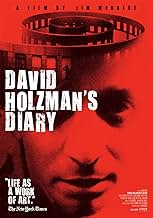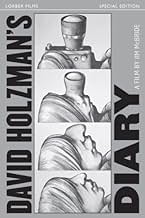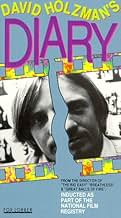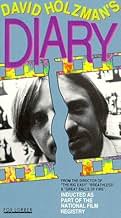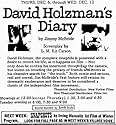CALIFICACIÓN DE IMDb
6.5/10
1.9 k
TU CALIFICACIÓN
Agrega una trama en tu idiomaA young filmmaker decides to make a movie of his life.A young filmmaker decides to make a movie of his life.A young filmmaker decides to make a movie of his life.
- Dirección
- Guionista
- Elenco
- Premios
- 2 premios ganados en total
Eileen Dietz
- Penny Wohl
- (as Penny Wohl)
Mike Levine
- Sandra's Boy Friend
- (as Michel Lévine)
Robert Lesser
- Max, Penny's agent
- (as Bob Lesser)
- Dirección
- Guionista
- Todo el elenco y el equipo
- Producción, taquilla y más en IMDbPro
Opiniones destacadas
Wildly unconventional and sadly underrated, "David Holzman's Diary" is, in my opinion, the greatest "found footage" film ever made. While "found footage" is a genre normally associated only with horror movies, and wasn't even a term in 1967, this still plays out extraordinarily similarly to a film like "The Visit" or "Willow Creek". However, it is much, much better and is a tragicomedy rather than a horror flick.
Before delving into the depths of this obscure oddity, one must be aware that it is a highly satirical film. It mocks the avant garde and cinema verite movement in a deadpan and, at times, subtle way. It portrays those who attempted to find art and truth in the painfully mundane as people who are pretentious, delusional, and occasionally creepy. Of course, I am something of a fan of these movements, but it is important to also note that the film isn't mocking ALL cinema verite or experimental films, just the highly pretentious and annoyingly boring ones that began to spring up back in the mid to late 60's.
Although he is something of an antihero, the film also gives poor David Holzman some sympathy as we witness his life steadily decay due to his cinematic obsession. It's tragic, it's satiric, and it's comic.
Before delving into the depths of this obscure oddity, one must be aware that it is a highly satirical film. It mocks the avant garde and cinema verite movement in a deadpan and, at times, subtle way. It portrays those who attempted to find art and truth in the painfully mundane as people who are pretentious, delusional, and occasionally creepy. Of course, I am something of a fan of these movements, but it is important to also note that the film isn't mocking ALL cinema verite or experimental films, just the highly pretentious and annoyingly boring ones that began to spring up back in the mid to late 60's.
Although he is something of an antihero, the film also gives poor David Holzman some sympathy as we witness his life steadily decay due to his cinematic obsession. It's tragic, it's satiric, and it's comic.
If you liked the Blair Witch Project, this is where they probably got the idea. Every film school shows this as an example of a completely fictional documentary, that works. Done in cinema verite style, the fictional angst filled life of a documentary maker falls apart, as he chronicles its disintegration, largely caused by his obsession with filming it as it crumbles. Like watching a train wreck.
David Holzman's Diary comes close to the "dream" of what was possible in the ideal of the American independent cinema of the 1960s. Taking the lessons of John Cassavetes with Shadows and French new wave filmmakers, specifically Godard and Truffaut, Jim McBride decided that shooting a narrative with a documentary approach- following the characters hand-held, without the artifice of a constricting studio- wasn't quite enough to get at a really personal cinema. At the same time his film is something of a cunning, if not always obvious, attack on "personal docu-style" essay movies. The idea that anyone can get a camera and make a movie or something on film about their lives has now mutated into something else with reality TV (True Life on MTV is like a professional extension of David Holzman's Diary), but at the time this was something extraordinary to attempt. And even today, it still shows.
This doesn't mean David Holzman's Diary is perfect, but then how could it ever be? Or would anyone in their right mind think it should be? It's imperfections are part of its... I won't say charm, since the film isn't exactly "charming", but it's got a certain something to it by having some longer takes, some shots or moments that are extended on David Holzman going on and on to the camera about his life, or what little there is of it. It's got that randomness of a diary, of anything popping into one's head put down on record. And that aspect, about film being "truth 24 frames a second, is one of the strongest things about it. It's message is both clear and hard to take: film is something that creates a reality of its own, as the male interviewee says, that a person can't have their own reality because of an aesthetic addition or distraction to it.
This won't be news to anyone who's seen docu-horror films like Blair Witch Project or Diary of the Dead, but the difference here is that of high-minded artistic aspirations. David Holzman is a filmmaker already, so to make a film about himself, mostly with him in his apartment pondering things like Vincente Minelli or Truffaut's comment on a woman's flicking of a wrist like Debbie Reynolds, it's bound to be pretentious. The trick is to know that McBride is mocking this particular high-and-mighty artist who does have some good intentions, while at the same time making a very personal kind of film. Seeing McBride and Michael Wadleigh's camera going down a block, put to the local radio station, then going past old people's faces in close-up in a park or going by a cop who may or may not know a "film" is being shot, is incredible on-the-fly material. That or just Holzman shooting out of the window as a voyeur on another woman in an apartment reveals as much about the character as the filmmaker making the film within the film. Did I mention that Holzman, long before the semi-tragic ending, shoots the television at night one frame every single cut and then puts all the frames together? It's awe-inspiring and breathtaking.
Might sound confusing, but it's worth it to take the experience if you know what you're getting, which is an experiment as much as a essay-style narrative. This doesn't mean all the performances are very good (I liked the woman in the car very much, the girl playing Penny or the male guy being interviewed not so much), but some moments, some truly cinematic experiences come out of it. 9.5/10
This doesn't mean David Holzman's Diary is perfect, but then how could it ever be? Or would anyone in their right mind think it should be? It's imperfections are part of its... I won't say charm, since the film isn't exactly "charming", but it's got a certain something to it by having some longer takes, some shots or moments that are extended on David Holzman going on and on to the camera about his life, or what little there is of it. It's got that randomness of a diary, of anything popping into one's head put down on record. And that aspect, about film being "truth 24 frames a second, is one of the strongest things about it. It's message is both clear and hard to take: film is something that creates a reality of its own, as the male interviewee says, that a person can't have their own reality because of an aesthetic addition or distraction to it.
This won't be news to anyone who's seen docu-horror films like Blair Witch Project or Diary of the Dead, but the difference here is that of high-minded artistic aspirations. David Holzman is a filmmaker already, so to make a film about himself, mostly with him in his apartment pondering things like Vincente Minelli or Truffaut's comment on a woman's flicking of a wrist like Debbie Reynolds, it's bound to be pretentious. The trick is to know that McBride is mocking this particular high-and-mighty artist who does have some good intentions, while at the same time making a very personal kind of film. Seeing McBride and Michael Wadleigh's camera going down a block, put to the local radio station, then going past old people's faces in close-up in a park or going by a cop who may or may not know a "film" is being shot, is incredible on-the-fly material. That or just Holzman shooting out of the window as a voyeur on another woman in an apartment reveals as much about the character as the filmmaker making the film within the film. Did I mention that Holzman, long before the semi-tragic ending, shoots the television at night one frame every single cut and then puts all the frames together? It's awe-inspiring and breathtaking.
Might sound confusing, but it's worth it to take the experience if you know what you're getting, which is an experiment as much as a essay-style narrative. This doesn't mean all the performances are very good (I liked the woman in the car very much, the girl playing Penny or the male guy being interviewed not so much), but some moments, some truly cinematic experiences come out of it. 9.5/10
Kit Carson's face has a relevancy even today, cutting through the demographic piece of the cake: he reminds one of Jean Pierre Leaud which is arguably one of the motives casting him as David Holzman, and he also reminds one of us today Beck's face, and his maybe signature lyric "I'm a loser baby, so why don't you kill me."
But David Holzman as his name says is a man holding - holding what? A camera for sure, the instrument that ultimately makes him fall apart; pursuing his credo stated right at the beginning and maybe, uneasily, hilariously put to the test for the rest of it, that is Jean-Luc Godard's phrase that the cinematic truth runs 24 times a frame. I liked the fact that he rises a bit his voice and somehow overacts his name with an American accent as if it was not far away from jeans, luck, God and art.
I admit I expected something closer to the "I do this, I do that" poetic compositions Frank O'Hara was doing a bit earlier the same period, for he too queered and mocked supposedly avant-guard procedures, or at least their seriousness. I thought David Holzman's self-indulgence slightly needed the more constant alertness he exemplified in scenes like the one in the park, with rows of old people on benches and a dubious voice-over international commentary - that broke away from the rather one-dimensional reaction poor Penny has and seems that she conceives her late boyfriend a simple stupid stalker.
For me the anthology scene is the one with David's friend who talks on camera theorizing about film, in front of a pop mural at his place - and when you think the way the tableau conveys it that you are about to have an illumination on Rosenquist and his tableaux and the American predicament or what, David's friend moves and goes back to the wall resting his head on the crotch on the figure behind. This is great sophisticated camp.
And for me it echoes finely when the end comes with an unexpected intuition on the other side of the pitch: in the end David Holzman says he would not have done it; the 24-times truth seems to him something close to Bartleby territory. "I would prefer not to". Not to do it he says, but this, exactly, seems to me a grim acceptance of the American predicament. What I mean by this is that Bartleby never says "not to do it", nothing comes after his "not to," his denial is a formal gesture without content, that is why his presence is so unbearable. David is not Bartleby but he stumbles upon his presence, perhaps the way Zapruder stumbled upon a President's assassination some years back in his own brand of home cinema verite, and this is what troubles David and makes the film something else than a diary.
But David Holzman as his name says is a man holding - holding what? A camera for sure, the instrument that ultimately makes him fall apart; pursuing his credo stated right at the beginning and maybe, uneasily, hilariously put to the test for the rest of it, that is Jean-Luc Godard's phrase that the cinematic truth runs 24 times a frame. I liked the fact that he rises a bit his voice and somehow overacts his name with an American accent as if it was not far away from jeans, luck, God and art.
I admit I expected something closer to the "I do this, I do that" poetic compositions Frank O'Hara was doing a bit earlier the same period, for he too queered and mocked supposedly avant-guard procedures, or at least their seriousness. I thought David Holzman's self-indulgence slightly needed the more constant alertness he exemplified in scenes like the one in the park, with rows of old people on benches and a dubious voice-over international commentary - that broke away from the rather one-dimensional reaction poor Penny has and seems that she conceives her late boyfriend a simple stupid stalker.
For me the anthology scene is the one with David's friend who talks on camera theorizing about film, in front of a pop mural at his place - and when you think the way the tableau conveys it that you are about to have an illumination on Rosenquist and his tableaux and the American predicament or what, David's friend moves and goes back to the wall resting his head on the crotch on the figure behind. This is great sophisticated camp.
And for me it echoes finely when the end comes with an unexpected intuition on the other side of the pitch: in the end David Holzman says he would not have done it; the 24-times truth seems to him something close to Bartleby territory. "I would prefer not to". Not to do it he says, but this, exactly, seems to me a grim acceptance of the American predicament. What I mean by this is that Bartleby never says "not to do it", nothing comes after his "not to," his denial is a formal gesture without content, that is why his presence is so unbearable. David is not Bartleby but he stumbles upon his presence, perhaps the way Zapruder stumbled upon a President's assassination some years back in his own brand of home cinema verite, and this is what troubles David and makes the film something else than a diary.
Mock cinema vertite about a young filmmakers consternation at finding 'truth' and putting it on film. Insightfully examines how we define reality, how our perceptions can cloud it, and whether it is really possible to show it on film. Probably to talky for most, but still quite thought provoking. Filled with some really offbeat ideas and camerawork. Among them: filming the faces of people at a bus stop while we hear excerpts from the McCarthy hearings. Also photographing a entire night of tv viewing each minute and then playing them back frame by frame. A very low budget movie, made by some very young filmmakers, with a very original point of view.
¿Sabías que…?
- TriviaShot on a budget of only $2,500.
- ErroresHolzman shows a montage of TV he says he watched on a Tuesday night in July 1967. He was wrong about the night. Although it's hard to date the Huntley/Brinkley Report newscast or the Joey Bishop Show late-night talk show, neither Batman, Star Trek or the Dean Martin Show aired on a Tuesday night. In July 1967, Batman aired on Wednesday and Thursday nights and Star Trek and the Dean Martin Show aired on Thursday nights. The montage is from a Thursday night.
- Citas
David Holzman: It was like rooms everything is so perfect, that everything is so perfect that they have to be kept, that because this random particular accidental state so meaningful, so, so touching, it's so touching, it's so beautiful.
- ConexionesEdited into 365 days, also known as a Year (2019)
Selecciones populares
Inicia sesión para calificar y agrega a la lista de videos para obtener recomendaciones personalizadas
- How long is David Holzman's Diary?Con tecnología de Alexa
Detalles
- Tiempo de ejecución1 hora 14 minutos
- Color
- Mezcla de sonido
- Relación de aspecto
- 1.37 : 1
Contribuir a esta página
Sugiere una edición o agrega el contenido que falta

Principales brechas de datos
By what name was David Holzman's Diary (1967) officially released in India in English?
Responda

